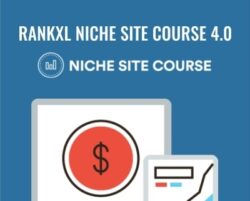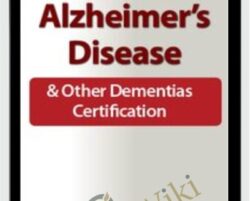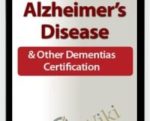Become an Evergreen Certified Dementia Care Specialist (ECDCS) while learning straightforward strategies and subtle tactics to make your practice more effective.It’s no secret…working with dementia patients can be difficult.And beyond the simple challenge of everyday conversation, you also have to learn to manage…Unpredictable combativeness — even aggressionDangerous wanderingParanoiaHallucinationsStrange delusionsDisruptive repetitive behaviorsAnd here’s what’s even more challenging:Our first instincts are not always the best treatment strategies.Working with dementia patients can be more counterintuitive than you think. But, with the right knowledge and techniques, you can transform challenging moments into patient (and personal) victories.And this program by licensed clinical neuropsychologist, Dr. Sherrie All, founder of the Chicago Center for Cognitive Wellness, can help you gain those skills.Plus, become an Evergreen Certified Dementia Care Specialist (ECDCS) after course completion!Imagine Your Life As An Evergreen Certified Dementia Care Specialist (ECDCS)…Becoming an Evergreen Certified Dementia Care Specialist (ECDCS) shows patients and colleagues you’re committed to providing the best care possible. And the best part is, your application for certification is included in the course price!Not only will you have more confidence in patient interactions, you’ll operate with more certainty in professional interactions too. All because you’ll be equipped with powerful dementia care information.Beyond that, certification is also a formal documentation of your specialized knowledge. It inspires trust from both patients and colleagues.And, as an added benefit, you could enjoy more favorable treatment from insurance companies and managed care panels too.Transform Your Practice an Expert Approach to Dementia CareWhat You Will LearnThis Alzheimer’s Disease and Other Dementias Certification program contains 6 eye-opening modules. Each module is designed to give you an important piece of the dementia puzzle. By the end of the course, you’ll have a comprehensive understanding of both dementia identification and treatment practices. Manifestations and Prognosis for Each Type of DementiaAs of 2015, there were about 47 million people worldwide living with dementia. And while cognitive decline is a normal consequence of old age, dementia is not. In this section, you’ll learn how to identify different types of dementia as well as the physical effects of dementia on the brain.The #1 risk factor for dementiaWhy dementia will bankrupt Medicare if we do nothingDementia vs. Alzheimer’s — what’s the difference?Three things that increase the risk for dementiaThe part of the brain most affected by Alzheimer’s diseaseThe special brain circuit that must be intact to form new memoriesThe two physical causes of Alzheimer’sThe seven stages of dementia based on the Global Deterioration Scale (GDS) and the Functional Assessment Staging Test (FAST)Pseudo-dementias and reversible conditions (How to make sure it actually is dementia…and not something else) Cognitive Assessment Tools and Advances in Early DetectionAccording to a 2017 study, dementia interventions can “transform the lives of people with dementia and their families.” But effective intervention depends on effective assessment and detection. This section will teach you how to assess for dementia.MoCA and SLUMS — what these two 10-minute tests tell you…and what they don’tThe four types of intervention for dementia (and the powerful, positive effect these interventions can have on patients and caretakers)Should you refer for a full Neuropsych evaluation? Here’s how to decideThe Alzheimer’s “risk-factor” gene Communication Strategies to Improve CarePeople with dementia communicate differently than the general population. Because of that, smart communication strategies are a must.The five types of communication problems exhibited by people with dementiaBest practices to avoid argumentsThree things you should never do when talking to a person with dementiaInnovative communication tools you can use when communication becomes difficult or slows to a stop Causes of and Solutions to Challenging BehaviorsCaring for a person with dementia can be challenging. Not just from a “time and effort” standpoint, but from a “how should I handle this?” standpoint. This module will equip you with helpful tactics to solve challenging behaviors.Two ways to assess for a hidden cause of challenging behaviorsSundowning — how to prevent it from happening and handle it when it doesThese five signs indicate a patient might be at risk for wandering — here’s how to spot themHallucinations vs. Delusions vs. Schizophrenia — How do you tell the difference?Paranoia Management Strategies”Feelings are more important than facts” — a 2003 study reveals why you should remember this counterintuitive quote when working with patients Psychopharmacology & Nutrition: The Latest Medications and Preventative TreatmentsDementia treatment isn’t only about how we interact with patients. This module will reveal the most helpful pharmaceutical and dietary interventions.”What medications have been approved for behavioral and cognitive symptoms?” This section will show youThe popular diet that’s been shown to have a positive effect on Alzheimer’s prevention and interventionA surprising class of over-the-counter drugs that actually contribute to dementiaOne simple activity that can be used as treatment for dementia (and can actually help grow more brain cells)Ethical Issues Related to DementiaEthical issues related to dementia include end of life challenges, abuse, and multicultural considerations. This section will help you identify potential issues and plan for effective interventions.End of life issues that could arise when caring for or treating a person living with dementiaShocking abuse statistics for people living with dementiaWhen mandatory reporting of abuse is required (and the professional fields that are required to report it)Multicultural issues that can factor into dementia identification and treatmentAfter this eye-opening course, you’ll have the knowledge to…Identify the symptoms of each type of dementia and how they impact identification and prognosisUse two powerful and effective assessment tools to screen for possible cognitive difficultyEmploy subtle, yet powerful communication skills to work harmoniously with patients who have dementiaCalmly address (and mitigate) challenging patient behaviors like wandering, aggression, and paranoiaUnderstand how medications, preventative treatment, and advances in early detection could impact care of people with dementiaBecome a champion of elder care ethics, working to ensure patients are respected in the way they deserveWhat You Will LearnThis Alzheimer’s Disease and Other Dementias Certification program contains 6 eye-opening modules. Each module is designed to give you an important piece of the dementia puzzle. By the end of the course, you’ll have a comprehensive understanding of both dementia identification and treatment practices.Manifestations and Prognosis for Each Type of DementiaAs of 2015, there were about 47 million people worldwide living with dementia. And while cognitive decline is a normal consequence of old age, dementia is not. In this section, you’ll learn how to identify different types of dementia as well as the physical effects of dementia on the brain.The #1 risk factor for dementiaWhy dementia will bankrupt Medicare if we do nothingDementia vs. Alzheimer’s — what’s the difference?Three things that increase the risk for dementiaThe part of the brain most affected by Alzheimer’s diseaseThe special brain circuit that must be intact to form new memoriesThe two physical causes of Alzheimer’sThe seven stages of dementia based on the Global Deterioration Scale (GDS) and the Functional Assessment Staging Test (FAST)Pseudo-dementias and reversible conditions (How to make sure it actually is dementia…and not something else)Cognitive Assessment Tools and Advances in Early DetectionAccording to a 2017 study, dementia interventions can “transform the lives of people with dementia and their families.” But effective intervention depends on effective assessment and detection. This section will teach you how to assess for dementia.MoCA and SLUMS — what these two 10-minute tests tell you…and what they don’tThe four types of intervention for dementia (and the powerful, positive effect these interventions can have on patients and caretakers)Should you refer for a full Neuropsych evaluation? Here’s how to decideThe Alzheimer’s “risk-factor” geneCommunication Strategies to Improve CarePeople with dementia communicate differently than the general population. Because of that, smart communication strategies are a must.The five types of communication problems exhibited by people with dementiaBest practices to avoid argumentsThree things you should never do when talking to a person with dementiaInnovative communication tools you can use when communication becomes difficult or slows to a stopCauses of and Solutions to Challenging BehaviorsCaring for a person with dementia can be challenging. Not just from a “time and effort” standpoint, but from a “how should I handle this?” standpoint. This module will equip you with helpful tactics to solve challenging behaviors.Two ways to assess for a hidden cause of challenging behaviorsSundowning — how to prevent it from happening and handle it when it doesThese five signs indicate a patient might be at risk for wandering — here’s how to spot themHallucinations vs. Delusions vs. Schizophrenia — How do you tell the difference?Paranoia Management Strategies”Feelings are more important than facts” — a 2003 study reveals why you should remember this counterintuitive quote when working with patientsPsychopharmacology & Nutrition: The Latest Medications and Preventative TreatmentsDementia treatment isn’t only about how we interact with patients. This module will reveal the most helpful pharmaceutical and dietary interventions.”What medications have been approved for behavioral and cognitive symptoms?” This section will show youThe popular diet that’s been shown to have a positive effect on Alzheimer’s prevention and interventionA surprising class of over-the-counter drugs that actually contribute to dementiaOne simple activity that can be used as treatment for dementia (and can actually help grow more brain cells)Ethical Issues Related to DementiaEthical issues related to dementia include end of life challenges, abuse, and multicultural considerations. This section will help you identify potential issues and plan for effective interventions.End of life issues that could arise when caring for or treating a person living with dementiaShocking abuse statistics for people living with dementiaWhen mandatory reporting of abuse is required (and the professional fields that are required to report it)Multicultural issues that can factor into dementia identification and treatmentGet Alzheimer’s Disease and Other Dementias Certification – Sherrie All, Only Price $59 Tag: Alzheimer’s Disease and Other Dementias Certification – Sherrie All Review. Alzheimer’s Disease and Other Dementias Certification – Sherrie All download. Alzheimer’s Disease and Other Dementias Certification – Sherrie All discount.
 The School of Chi Energy Training – Sifu Rob Jones
₹15,438.00
The School of Chi Energy Training – Sifu Rob Jones
₹15,438.00
 RankXL Niche Site Course 4.0 – Chris Lee
₹7,304.00
RankXL Niche Site Course 4.0 – Chris Lee
₹7,304.00
Alzheimer’s Disease and Other Dementias Certification – Sherrie All
₹9,130.00





